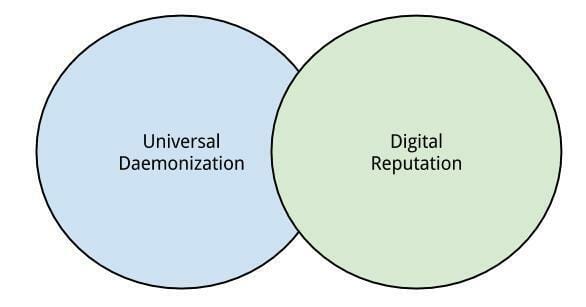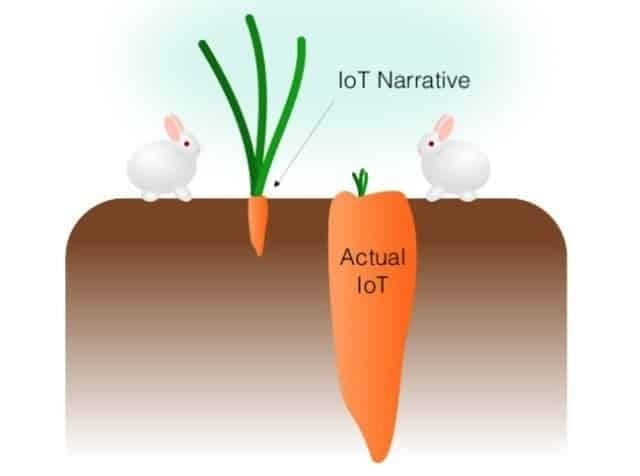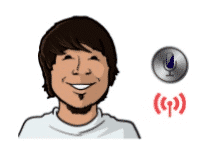2 Trends That Will Shape the Real IoT

The Internet of Things is a confusing thing. To some it’s a network like the Internet. To others it’s all about sensors and machines talking to each other to make business more efficient. And many see it as a way to optimize home living, with your watch starting your toaster and coffee maker when you wake up.
Those are neat, but they’re not the big story.
The real promise of the Internet of Things comes as a disruptive and fundamental change in how humans interact with their surroundings—including other people and everyday objects.
This will happen by combining two technology innovations that I believe to be imminent.
1. Universal Daemonization
Imagine every object around you having an interactive daemon associated with it. If it’s a human, this daemon will tell you what that persons name is, what they like to eat, where they’re from, what their favorite movies are, favorite reading, what pets they have, that they’re going to a Tool concert next Friday, etc.
If the object is a business (say a restaurant), they’ll broadcast their menus, their safety and health record, the names of the waiters currently working, the fact that they have open-mic night tonight, which foods have allergens in them, and what the current specials are.
The same goes for any kind of business, or any kind of object really. But it won’t just be a new way to get information about something. These daemons are interactive. They’re APIs.
So for the human, you can "like" them as you walk by. You can send an invitation to "connect", which opens more sensitive parts of your profile to them as they sit across the coffee shop, or you send them a professional connection invite via LinkedIn if their daemon shows they’re in the same business as you.
But here’s the cool part—it won’t be you doing any of this. It’ll be your digital assistant. Siri will be doing this on your behalf. Or Cortana, or Google Now. Whoever you’re using. So as you’re moving about your life during the day, you’re passing hundreds or thousands of objects. Businesses. People. Restaurants. Whatever. And Siri, who knows you better than anyone after months of tuning, will be sending connection requests, parsing daemons on your behalf, only occasionally prompting you in your ear if you want her to do something for you.
Examples:

A girl in line smiles at you because you have the same favorite book
You walk into a sports bar and the TVs change to your favorite sport
You wave your hand on your home lock, and it opens because it knows you
Siri whispers that the guy behind you in line went to the same school
As you get into any BMW the car adjusts to your preferences
When you walk into any room, the AC adjusts to your preferred temperature
Your house configures its music and lighting based on your mood
So that’s Universal Daemonization: every object—including humans—have a two-way interactive daemon that provides information about the object and allows things to interact with it, usually mediated by a personal assistant.
Now onto the second piece…
2. Digital Reputation

The second piece of this combination is the idea of continually updated, and centrally validated Digital Reputation. So within each of our daemons we’ll not only have the information that we broadcast about ourselves, but information that others have validated about us.
These are things like how reliable we are, how good our credit is (which may be abstracted of course), how funny we are, what kind of special privileges we might have, like a token to gain access to a private club, etc.
It will also include recommendations or validations for professional skills you have. So, perhaps you have a 497 score in the Information Security field, specifically in malware forensics. Notably, giving such recommendations will have a karma cost to the granter, making it far more valuable. And maybe you’re also an amateur astronomer, and you have a 33 score in that.
But it won’t just be professional things that you can be granted ratings in. It can be anything. Gaming. Humor. Sexiness. Stylishness. Rudeness. Whatever. People can walk down the street, see you, and make an Iron Man gesture in your direction with a smile, and send you a courtesy token,which you can add to your public profile. People will be allowed to hide these scores within their daemons, of course, but people will generally want to show them if they’re positive.
What’s fascinating about this is how much it will disrupt the current work paradigm. This will basically bring the Uber model to everyone, for everything. You want to go to work? You just drive around in your city, tell Siri you’re open for jobs, and requests will pour in. Siri might say,
Job offer for dogsitting, two blocks away. Pay is $28/hour, and the requester has a platinum rating. Should I accept and take you there?
Why dogsitting? Because it’s in your daemon. And all the person offering the job had to do was say,
Find me a dogsitter within 10 minutes drive who has a rating of gold or above.
Companies, recruiters, and much of the existing employment infrastructure will be replaced by a tech layer that algorithmically finds perfect matches based on location, ratings, preferences, etc. You simply tell the world you’re open for certain types of work, and jobs come in based what you’re charging, how good a job you do, etc.
Examples:
You walk out of a coffee shop and say, "Get me a ride home.", and a car stops within 30 seconds to take you. Think Uber, but anyone and everyone can participate (if they have the right tokens and ratings in their daemon)
Headhunters get other jobs because theirs are now done by the middleware algorithm layer that links requesters with providers
You pass a man on the street who is hungry, and you transfer them enough money for a meal with a handshake, or even a kind gesture
You finish your apprenticeship as a sculptor, and your Master grants you a recommendation that legitimizes you within the system and allows you to perform jobs for anyone in the world
You like to sing people to sleep, and you have some decent ratings for doing it, so you tell Siri you’re willing to do it for Kudos, and within 12 seconds you’re singing RockabyBaby to a 2-year-old in Nairobi
Someone can sling you $4 for being kind to someone on the street, along with a KindnessToken. 20 minutes later you pass it on to someone else
Merging the concepts

The reputation component merges elegantly with Universal Daemonization because your reputation is part of your identity, and that’s what your daemon represents. It follows you, because it is you.
Augmented reality will thrive in this environment. You’ll be able to look around (through contact lenses or glasses) that allow you to see the world in different contexts. Want to know who the socialites are? Want to know who has the highest net worth? Want to know the funniest person in the room? Their bodies will have a green halo around them. Their daemons will be broadcasting that data, signed by the reputation authority that validates the scores.
Walking through a bad neighborhood? Look out for those who are off the grid (no daemon), or those who have low social scores (rudeness, violence, past criminal history, etc.). If you think that sounds like a privacy violation, don’t worry—a lot of people with these things will be willingly advertising these attributes.
Think of dating. You’re a single person who loves dogs? Walk into a bar with that filter on and BAM—every person who matches that description is lit up among the rest.
It’ll work for businesses, too. Walk down a road full of restaurants and look around and you’ll see buildings outlined in red (avoid), gray (meh), and green (yum). It applies to so…many…things.
Summary

This is the Internet of Things. It’s about humans seeing and interacting with the world in completely new ways. It’ll change how we gather information from our surroundings, how objects and environments customize themselves to our preferences, how we market our worth to others, how we find work, how we give and receive praise.
The Internet of Things will change how humans interface with the world, and two of the main mechanisms will be Universal Daemonization and Digital Identity.
Notes
Universal Daemonization, I argue, will be enabled by existing web technologies, such as TCP/IP, HTTP(s), and RESTFUL web services. So it’s not some kind of tachyon-warpdrive tech—it’s real stuff that will be relatively easy to implement.
A big part of Universal Daemonization is the concept of federated identity, meaning that as you move around the world you will be doing so as a unified you. It’s one ID that you can use to gain access to locations and services, and that others can tie to your real identity.
What people broadcast in their daemons will be largely up to them, so the items listed above are just examples that are more likely to be broadcasted by young people.
The potential for abuse with a centralized reputation and rating system like this is staggering. You could band with a few dozen people and attack the rating of someone in their core business. Or you could artificially raise someone else’s. But these are problems that we 1) not only have right now to some degree, but 2) will not be able to avoid. This is coming whether we want it to or not.
China has started something like digital reputation > already, which seems a bit scary given the source (the Chinese government) and their political leanings.
One thing that I hope this brings is something of a creative economy, where people can create, share, and ultimately sell things like short stories, book ideas, screenplays, and paintings much easier than now. This will be especially important as we transition away from work that requires humans.
Images from iconizeme.com.